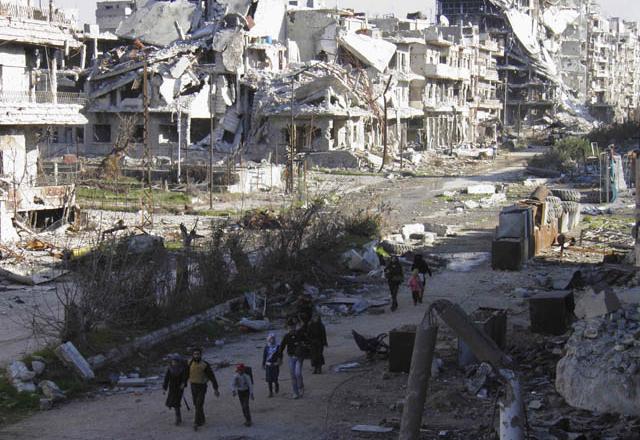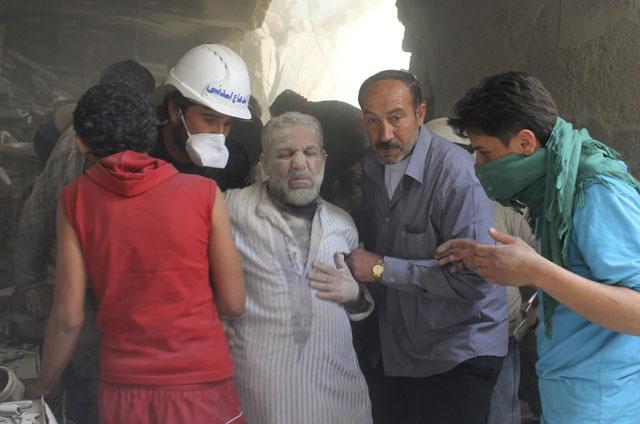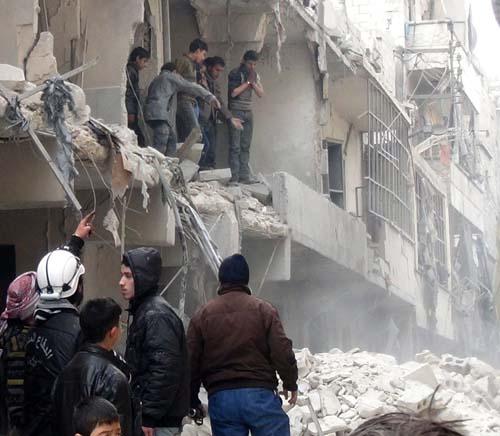GENEVA/BEIRUT — A second round of Syria peace talks got off to a shaky start on Monday, with the two sides complaining about violations of a local ceasefire and an Islamist offensive respectively in separate meetings with the international mediator.
Ahead of the talks, mediator Lakhdar Brahimi told delegates to commit first to discussing both ending the fighting and setting up a transitional government.
The government side said combating “terrorism” — its catchall term for the revolt — should be agreed first. In a further bad sign, Brahimi cancelled a planned news conference.
During the first round of talks in nearly three years of civil war last month, Brahimi had tried to break down mistrust by focusing on agreeing a truce for a single city, Homs.
A three-day pause only began on Friday, and aid workers were fired upon as they evacuated civilians on Saturday.
The Syrian Red Crescent said 300 more people had been evacuated on Monday, taking the total to leave the city after more than a year under government siege to around 1,000, and the UN said the truce would be extended through Wednesday.
The UN World Food Programme underlined how far there was to go. “The old city of Homs is just one of 40 besieged communities in Syria. Altogether a quarter of a million people have been cut off from humanitarian aid for months,” it said.
A letter from Brahimi given to the delegates over the weekend said the new round aimed to tackle the issues of stopping violence, setting up a transitional governing body, and plans for national institutions and reconciliation.
It included a plea: “Will the two sides ... contribute even at a minimum, towards lessening the manifestations of violence, stopping the use of certain weapons and reaching ceasefires in some areas, even for a short period?”
The opposition says a transitional governing body must exclude President Bashar Al Assad. The government says it will not discuss his leaving power.
A deep split in the international community over the conflict has entrenched those positions. In a clear bid to overcome that, the UN said Brahimi would meet US and Russian officials on Friday.
Barrel bombs
Opposition delegates said they had handed Brahimi their view of what a transitional government should look like and submitted witness statements they said showed the army had fired at the Homs aid convoy. The government blames the rebels.
The opposition also said there had been an escalation in the government’s use of “barrel bombs” — oil drums or cylinders packed with explosives and metal fragments and usually dropped from helicopters. It said more than 1,800 Syrians had been killed by them last week, half in rebel held parts of Aleppo.
“It is not acceptable that the regime will send its own delegation to peace talks while it is killing our people in Syria. This must stop,” opposition spokesman Louay Al Safi told reporters after the delegation met Brahimi.
Representatives of fighters on the ground joined the delegation for the first time, a senior opposition member said on Monday, but they did not include the Islamic Front alliance, the biggest faction fighting Assad’s forces.
Powerful Islamist groups have denounced the opposition team, made up mainly of political exiles, as traitors, undermining any prospect of lasting peace.
The mediator plans to keep meeting the two sides separately in Geneva over the next two to three days in hopes of improving the atmosphere at the talks and aims for a second week focusing on the continuity of state institutions and reconciliation.
One Middle East diplomat said Brahimi should avoid getting bogged down in detail, arguing that had played into Assad’s hands in the first round of talks over Homs.
“The best way to proceed is for Brahimi to form committees to deal with ceasefires and the humanitarian issues while keeping the two delegations focused on the big political question,” the diplomat said.
The Syrian government delegation urged Brahimi to condemn an Islamist offensive on Sunday which it said killed 42 people in the town of Maan in central Syria populated mainly by Assad’s Alawite sect.
“Ending violence and combating terrorism and requiring the countries supporting [terrorism] to stop ... is the first issue that should be agreed upon to pave the way for the launch of the political process,” the delegation said in a document given to Brahimi and seen by Reuters.
Islamist fighters not represented at the talks seized a village in the central province of Hama on Sunday, trying to cut off supply routes from Damascus to the north.
The Syrian Observatory for Human Rights monitoring group put the death toll at 41, 21 of them civilians and the other 20 from the pro-Assad paramilitary National Defence Forces.
The government said the dead were mainly women and children and accused the fighters of committing a massacre on the eve of the resumption of peace talks in Geneva.
Al Qaeda infighting
Activists and rebels said an Al Qaeda splinter group had withdrawn its forces from Syria’s oil-rich eastern province of Deir Al Zor after days of heavy fighting with its rivals.
Islamist opposition groups joined forces with some secular rebel units to fight the Islamic State of Iraq and the Levant (ISIL), with whom they have territorial disputes and ideological differences.
ISIL, which has attracted many foreign Islamist militants into its ranks, is a small but powerful fighting force in Syria’s opposition areas. It has alienated many civilians and opposition activists, however, by imposing harsh rulings against dissent in areas it controls, such as beheadings.
The civil war which grew from a crackdown on protests against Assad has killed more than 100,000 people, forced millions from their homes, and destabilised neighbouring countries.
One Western diplomat said the government was showing little sign of commitment to the peace talks. “Homs is not encouraging. They [the government] are not making a colossal effort.”
Syrian Deputy Foreign Minister Faisal Mekdad said the government was adopting a “very, very constructive approach”.



















